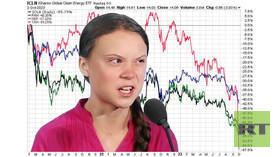
Clean-energy stocks plummet as renewable energy projects prove to be too expensive, threatening America’s environmental aspirations
Russian Market is a project by a financial blogger, Swiss journalist and political commentator based in Zurich. Follow him on X @runews

© RT / RT
The once-glorified clean-energy stocks are now facing their darkest days, plunging the industry into a financial abyss that threatens America’s ambitious environmental aspirations. The much-touted green revolution is looking more like a red alert as the sector hemorrhages tens of billions in market value.
Sure, we’re told that hundreds of billions is still pouring into renewable energy projects, despite the fact that the stock market seems to have declared a resounding “no thanks” to these ventures. The iShares Global Clean Energy ETF (Exchange-Traded Fund), the poster child for the industry, has nosedived by over 30% this year and a whopping 50% since the dawn of 2021.
Not to be outdone, specific sectors are getting their fair share of punishment. The Invesco Solar ETF is down over 40% in 2023, while the First Trust Global Wind Energy ETF is witnessing losses of about 20% this year and a grim 40% since January 2021. It seems the wind has been knocked out of their sails.
Blame it on rising interest rates, the industry’s newfound nemesis. These higher rates have not only increased costs but also put a damper on consumer enthusiasm, leading to a nosedive in stock valuations for companies that once promised a green utopia but are now struggling to turn a profit.

Solar companies such as SolarEdge and Enphase Energy are feeling the burn as demand for their products dwindles. Meanwhile, wind energy giant Orsted is singing the blues, with shares plummeting after revealing potential multibillion-dollar write-downs on its offshore wind projects in the US.
In Germany, after the Nord Stream sabotage, because, you know, energy geopolitics and straightforward plans always go hand in hand, a whopping 77% of skeptics are shaking their heads, expressing disbelief that the nation will magically conjure up 80% of electricity from renewables by 2030. I guess turning skepticism into solar power hasn’t quite hit the mainstream yet.
Switzerland, the poster child for phasing out nuclear power, is now flexing its green muscles by entertaining the idea of keeping nuclear plants running longer, because who needs a clear exit strategy when you can just extend the atomic party until 2040?
Biden’s green dreams are melting faster than his favorite ice cream in the sun
In the US, the demise of two New Jersey wind projects is just the tip of the iceberg, with inflation, sky-high interest rates, and a supply chain in shambles throwing a wrench into the gears of Joe’s climate ambitions. Despite a whopping $369 billion in federal aid from his climate law, clean energy projects are dropping like flies. Even the postponement of a Kentucky EV battery plant by Ford and General Motors trimming their EV plans couldn’t escape the economic tempest. It seems the only thing rising faster than hopes for a clean energy revolution is the cost. But hey, who needs affordable, reliable energy when we’ve got grand climate goals, right? Biden’s green plans are becoming a chilling reality check, and it’s not just the polar ice caps feeling the heat.

It’s ironic, isn’t it? Not too long ago, clean energy was hailed as the savior of our planet, but now it seems the green agenda is drowning in a sea of red ink. The S&P Global Energy index, once a shining star, has seen its value halved since 2020 – a spectacular fall from grace.
Fast forward to the present, and we witness the mighty green stocks taking a severe beating. Despite the EU and US governments offering billions in tax credits and subsidies to support the so-called green transition from Russian oil and gas, investors are losing confidence faster than you can say “renewable.”
The S&P Global Clean Energy Index has experienced a gut-wrenching 30% freefall in 2023, with the biggest quarterly outflow of $1.4 billion. The once-booming sector now holds a 23% decline in total assets under management, a far cry from its heyday just a few months ago.
Blame it on the current economic climate, they say – high interest rates, soaring costs, and supply chain woes are the villains of this melodrama. And let’s not forget China, the puppet master of the solar supply chain, flooding the market with cheap alternatives, undermining the EU’s dreams of a local green market.
As utility stocks struggle to convert to green energy, the sector’s operating margins are squeezed.
The final nail in the coffin? NextEra Energy Partners cutting its growth target by half, sending shockwaves through the renewable industry. I dismiss the sell-off as overblown, but the damage is done, and confidence in renewables has hit rock bottom.

So, what’s the moral of this green tale? It turns out, going green is not just about saving the planet; it’s an expensive affair. As the renewable energy stocks hit rock bottom, analysts are left wondering: is it time to buy, or is the green dream truly over?
In a deliciously ironic plot twist, Greta Thunberg is currently sizzling in the crucible of criticism for daring to support Gaza. It seems our climate crusader is now facing a cancel-culture bonanza, much like the tweet she swiftly deleted – you know, the one prophesying Armageddon and cautioning that climate change might just “wipe out humanity” unless we magically halt fossil fuel usage by the grandiose deadline of 2023. The irony is thicker than Beijing’s smog, folks.
Seems like even the green warriors can’t escape the unforgiving reality of the market.
The statements, views and opinions expressed in this column are solely those of the author and do not necessarily represent those of RT.




